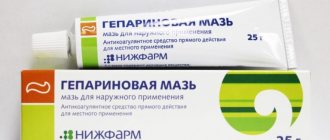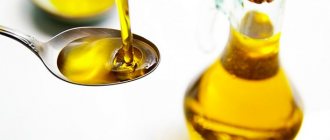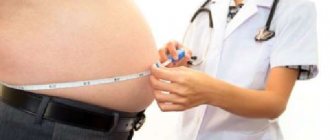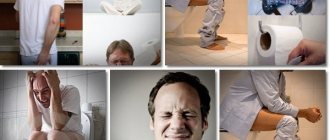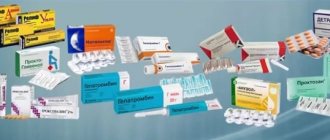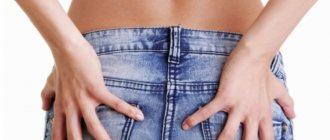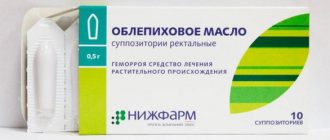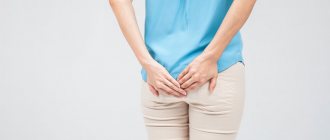Causes of exacerbation of the disease
It is difficult not to notice the manifestations of hemorrhoids; with exacerbation, itching, burning, and pain in the anus appear. In advanced cases, rectal bleeding occurs and hemorrhoids fall out.
The pelvis contains a large number of veins that transport blood to the intestines. When the venous outflow in the rectum is disrupted, the vessels become overfilled with blood, and hemorrhoids form.
Under the influence of negative factors, formations increase and periodically become inflamed. Then the lumen of the rectum decreases, defecation becomes difficult, and characteristic symptoms of the disease appear. Exacerbation of hemorrhoids can be caused by the following factors:
- Passive lifestyle;
- Poor nutrition;
- Diarrhea;
- Constipation;
- Excessive physical activity (heavy lifting);
- Pregnancy;
- Childbirth.
In addition, the risk of exacerbation increases with frequent stress and psycho-emotional stress. Every person should know how to quickly help themselves with hemorrhoids at home in order to alleviate their condition. However, you need to act carefully, because if treated incorrectly, complications may arise.
What provokes the exacerbation stage
Why does hemorrhoids worsen and how to avoid it? During the stage of exacerbation of hemorrhoids, the causes may include the following unfavorable factors:
- Incorrect, unbalanced diet. Why do hemorrhoids become inflamed in this case? Eating fried, salty, spicy, smoked foods leads to a decrease in the activity of intestinal motility and irritation of the mucous surface. As a result, a person experiences frequent constipation. Including fiber-rich foods in your diet will help correct the situation. Laxatives can be used.
- The causes of exacerbation of hemorrhoids can be associated with a sedentary lifestyle. This leads to stagnation of blood in the lower rectum.
- Acute hemorrhoids develop due to frequent heavy lifting. Heavy physical activity causes a large amount of blood to flow into the final part of the rectum.
- Exacerbation of hemorrhoids in women can occur during pregnancy and childbirth. The growing uterus, especially in the second and third periods of pregnancy, begins to put pressure on all internal organs, not excluding the intestines. Constipation develops. During childbirth, you have to push a lot, which leads to the fact that the chronic stage turns into an acute form and the lump can become inflamed.
- Symptoms of hemorrhoids in men can worsen due to bad habits (smoking, alcohol). Why is this happening? Strong or even low-alcohol drinks cause the blood vessels to dilate, and the blood begins to circulate at twice the speed, reaching each organ in large quantities. Blood stagnation occurs in the rectum.
If hemorrhoids worsen, symptoms such as severe itching, a feeling of pressure, and burning in the anal area appear. Bleeding is observed. The inner wall of the rectum and the external anus are very painful. The pain bothers me even in a calm state, with minor movements; after defecation it intensifies.
When hemorrhoids become inflamed, you need to take immediate action. Otherwise there may be complications. Bleeding increases, prolapse of the hemorrhoidal node may occur, and blood clots form. The node may externally change color, becoming dark burgundy in color, dense and painful to the touch.
First aid for exacerbation of hemorrhoids at home
If the symptoms of the disease appear suddenly, the patient should know how to provide first aid for acute hemorrhoids at home :
- Rinse the anus with cool water after each bowel movement to avoid the spread of pathogens;
- In case of severe pain, apply cold to the anus, and then make a compress from a weak solution of potassium permanganate. This will help relieve pain and stop the growth of bacteria. Sitz baths with cool decoctions of medicinal plants will also help;
- To relieve severe pain, rectal suppositories with lidocaine or novocaine are used;
- After the pain has subsided, it is recommended to clean the anus with an enema. This will help soften accumulated stool and speed up its passage. However, use an enema with a soft tip, which must be lubricated with Vaseline, so as not to injure the hemorrhoids;
- If you suffer from chronic hemorrhoids , then use the medications prescribed by your doctor.
During exacerbation of the disease, physical activity is contraindicated, for example, playing sports, lifting weights. These actions increase intra-abdominal pressure and blood flow to the vessels of the rectum. Standing and sitting are also not worth it; it is better to take a horizontal position.
During defecation, it is forbidden to strain, as there is a risk of damage to the walls of blood vessels or varicose veins.
If you have constipation, do a cleansing enema to help. It is advisable to visit a doctor who will conduct an examination, assess your condition and draw up a treatment plan. Self-medication may make your condition worse.
Development of internal hemorrhoids
Treatment of internal hemorrhoids at home can be carried out after a final diagnosis has been made. Some diseases have symptoms similar to hemorrhoids, so it is necessary to undergo an examination and coordinate home therapy with your doctor.
In the early stages of hemorrhoids, internal nodes appear. From time to time a person experiences unpleasant sensations similar to finding a foreign body in the rectum, as well as a feeling of heaviness in the rectal area. After defecation, especially if constipation occurs, bloody marks may appear on the toilet paper.
As the disease progresses, the symptoms intensify. Due to the narrowing of the intestinal lumen, hemorrhoids are increasingly damaged during defecation, and the appearance of blood in the stool and on toilet paper begins to become common. During this period of the disease, hemorrhoids come out during bowel movements, but then return to their place.
At the last stage, hemorrhoids manifest themselves with even more intense symptoms. Bowel movements become very painful and are accompanied by large blood loss. The nodes begin to fall out more often and no longer adjust on their own. The last stage of hemorrhoids requires surgical treatment, so it is important to see a doctor as soon as possible.
Urgent care for hemorrhoids with bleeding
Rectal bleeding is a consequence of damage to thinned vessels of the rectum or enlarged nodes. This condition can be caused by constipation, prolonged diarrhea, in which the mucous membrane becomes inflamed and thinned, and excessive straining during bowel movements. In addition, the risk of bleeding increases with advanced hemorrhoids, when large inflamed lumps are present.
It is necessary to provide emergency assistance for hemorrhoids at home if you notice bleeding from the anus:
- Wash yourself with cool water and apply a cold compress to the anal area. Under the influence of low temperatures, the walls of blood vessels become less permeable, the veins narrow, and then the hemorrhage stops;
- For external hemorrhoids, use cold lotions. A cotton pad or gauze should be moistened in cold water and applied to the hemorrhoids. For compresses, you can use cool decoctions of medicinal herbs. You can also apply ice wrapped in a clean cloth to the anus. However, do not keep the cold on the affected area for a long time, as there is a risk of inflammation of the pelvic organs (kidneys, bladder, genitals);
- to stop bleeding in internal hemorrhoids. To make them, form a small cone out of cardboard, fill it with water or an astringent herbal infusion, and place it in the freezer. Then take out the candle, free it from the paper, dip it in boiling water for a couple of seconds, and then insert it into the anus. At first, hold it for 5 seconds, and then you can slightly increase the exposure time;
- Use drugs that accelerate blood clotting, for example, Etamsylate, Dicynon, Vikasol. Injections and tablets are used only in extreme cases. In addition, using them for a long time without the knowledge of a doctor is prohibited;
- Collagen hemostatic sponges with precipitate acid and furatsilin are used for severe hemorrhage. The sponge is applied to the anus for 1 - 2 minutes, it becomes saturated with blood, and then compresses the blood vessels, stopping the bleeding. In addition, it demonstrates a disinfecting and wound-healing effect. In case of internal hemorrhage, the sponge is folded and inserted into the posterior opening. There is no need to take it out, as it dissolves.
These steps, when providing emergency care for hemorrhoids at home, will help stop rectal bleeding. However, after this you should visit a doctor who will draw up a treatment plan, otherwise the episodes may recur.
First aid for hemorrhoids in men and women
The rules for providing first aid for acute hemorrhoids for men and women are practically the same. When the disease worsens, it is necessary to wash the anus with cool water, apply compresses and use ice suppositories.
It is important to remain calm and avoid physical activity. Patients can also use rectal suppositories and ointments to relieve inflammation and pain. In case of bleeding, it is recommended to use hemostatic drugs, as well as a collagen sponge.
After relief of the condition, you should visit a doctor who will formulate the correct treatment tactics.
It is most difficult to provide first aid for hemorrhoids to pregnant and lactating women, since they are prohibited from using many medications. This is due to the fact that medications can harm the fetus or baby. Any medications can be used only after consulting a doctor.
Most often, during pregnancy and breastfeeding, drugs are used in the form of rectal suppositories, since they act locally, are practically not absorbed into the bloodstream and do not harm the baby.
The best option is Relief and Anestezol suppositories. You can also use suppositories based on natural ingredients (calendula, St. John's wort), which have a calming effect.
To treat hemorrhoids, you can use suppositories prepared at home. Propolis and oil can be used as the main components. You can also make compresses based on a decoction of chamomile, calendula, St. John's wort, sea buckthorn or flax oil.
Symptoms of the acute stage of the disease
The first signs of hemorrhoids begin with: itching, burning, discomfort and a feeling of heaviness in the anus. Over time, pain appears, which intensifies during bowel movements. During an exacerbation, the pain syndrome can be so severe that a person cannot sit or lie on his back.
The patient is afraid to have a bowel movement and refuses to eat, which only worsens his condition. Then the risk of developing chronic constipation increases; hard feces damage the inflamed rectum even more.
Due to constant discomfort, a person becomes irritable, sometimes the disease is accompanied by symptoms of intoxication (fever and chills).
In the later stages, the inflamed hemorrhoidal cones fall out. At first they retract on their own, but over time (if left untreated) they have to be pushed back in.
This then increases the risk of thrombosis, which can only be cured by surgery. In some cases, poor circulation of the inflamed node provokes the appearance of ulcers and tissue death. In this case, urgent surgery is also required.
Rupture of hemorrhoids causes severe bleeding and increases the likelihood of anemia.
If the patient does not maintain personal hygiene or does not carry out proper treatment, then there is a risk of a bacterial infection. Then purulent processes develop, in some cases sepsis (blood poisoning) is possible, which threatens the patient’s life.
Treatment of the pathological process
Hemorrhoids need to be treated comprehensively; the treatment plan depends on the symptoms, severity of the disease, age and individual characteristics of the body. Therefore, if signs of exacerbation of the disease appear, you need to visit a proctologist. The specialist will tell you what medications to use to relieve the symptoms of the disease.
Typically, tablets, rectal suppositories, ointments, and gels are used to treat hemorrhoids. You can supplement drug therapy with folk remedies, but this issue should be discussed with your doctor.
Use of drugs
The following medications are used in the treatment of hemorrhoids:
- Painkillers. First of all, you need to eliminate painful sensations; for this, Diclofenac, Nise, Ketonal and other painkillers are used. Combination medications also help reduce pain, for example, rectal suppositories Ultraproct, Gepatrombin G, Anuzol, Proctoglivenol;
- Anti-inflammatory drugs. If inflammation intensifies, then patients are prescribed drugs with an anti-inflammatory effect: Levomekol, Levasin, Vishnevsky ointment, etc. For hemorrhoidal thrombosis, venotonics and drugs that accelerate the resorption of the blood clot and blood thinning are effective: Troxevasin, Heparin ointment, Hepatrombin, Heparin;
- To stop bleeding. For bleeding hemorrhoids, rectal suppositories based on adrenaline are used, which constrict the blood vessels. To stop bleeding, drugs with a hemostatic effect are used, for example, Spongostan, Adroxon;
- For hemorrhoids with anal fissures, suppositories and ointments of the Relief brand are prescribed. These drugs contain natural ingredients that accelerate the regeneration of damaged tissues. Suppositories based on sea buckthorn and belladonna also promote healing of the mucous membrane and relieve pain.
During treatment, it is recommended to combine medications for internal and external use. An effective venotonic called Detralex will help speed up recovery. Preparations in the form of ointments or gels have the same properties as suppositories.
For acute hemorrhoids, doctors recommend using ointments, since they are easier to treat the affected intestine and reduce the likelihood of damage to hemorrhoidal formations.
They help relieve pain, inflammation, swelling, accelerate regeneration, and stop the development of bacteria. Ointments are used for internal and external hemorrhoids.
Traditional methods
To alleviate the condition, you can use natural remedies in the form of suppositories, compresses, enemas and baths:
- You can treat hemorrhoids with potatoes. Cut a candle 5 cm thick from raw potatoes and carefully insert it into the anus before going to bed. This will help reduce inflammation and bleeding. Before using a potato suppository, it is recommended to cleanse the intestines with an enema;
- Carrot candles are made as in the previous recipe. Place them before bed for about an hour. They stop the development of bacteria and accelerate wound healing. To increase the effect, you can lubricate the candle with honey (if you are not allergic);
- Pour water into cone-shaped molds or rubber fingertips and place in the freezer. Then dip them in boiling water, remove them from the shell, insert them into the anus for 5 seconds, gradually increasing the time to 30 - 90 seconds. Ice suppositories relieve pain and stop bleeding;
- Perform enemas with a decoction of oak, bird cherry, and chestnut. They demonstrate a pronounced hemostatic and astringent effect, reduce inflammation and itching;
- Make compresses with calendula infusion. It can also be used for enemas, baths or making candles.
Before using traditional methods of treatment, consult your doctor.
For compresses and baths, you can use decoctions of nettle, yarrow, tansy, sage, etc. Medicinal liquids have an anti-inflammatory and disinfecting effect.
Surgery
In the last stages of hemorrhoids or when complications develop (excessive rectal bleeding, thrombosis of hemorrhoidal cones, colitis, purulent inflammation of the rectum), surgery is prescribed. Surgical treatment is carried out using the following techniques:
- Hemorrhoidectomy is an operation to remove hemorrhoids. It is carried out using an electric scalpel, surgical laser, radio wave or ultrasonic scalpel;
- Longo's operation - excision of the mucous membrane above the nodes and application of a circular suture. After the operation, the formations are tightened and returned to their place.
There are minimally invasive techniques that are less traumatic than standard operations:
- Ligation of hemorrhoidal formations using latex rings. After the procedure, necrosis or rejection of the tissue of the node occurs;
- Infrared coagulation is used to remove small bumps;
- Sclerotherapy is the introduction of a special substance into the varicose formation, which glues its walls;
- Cryotherapy – freezing hemorrhoids.
Minimally invasive operations are performed only at the stage of remission of hemorrhoids.
How to treat hemorrhoids with folk remedies?
Alternative ways to combat rectal thrombosis help reduce the intensity of pain and the severity of symptoms associated with the disease. Proctologists recommend treating hemorrhoids with traditional methods at home only in combination with a course of prescribed medications, exercises and diet. Neglect of conservative medications is fraught with complications of the pathology.
Alternative treatment for hemorrhoids at home must be approved by a specialist. Some methods have a negative irritating effect on damaged mucous membranes lining the rectum, which provokes increased swelling, swelling of thrombosed veins and bleeding. Only two recipes are considered the most acceptable and hypoallergenic.
Treatment of hemorrhoids with potatoes
The presented technique is recommended for internal, external and combined forms of the disease. From a fresh and peeled tuber, you need to cut out oblong (4-5 cm) sticks of such thickness that they painlessly enter the anus; it is better to round the edges of the “suppository”. Potato suppositories for hemorrhoids are administered in the evening; they must be left in the rectum all night. Starch from tubers produces a drying, hemostatic and vasoconstrictor effect. To treat the symptoms of pathology at home, you will have to perform 10 procedures.
If hemorrhoids have already fallen out, compresses should be made instead of suppositories. Juice squeezed from the pulp of grated raw potatoes should be soaked in a piece of sterile cotton wool and applied to the inflamed “bumps”. After 20 minutes, the lotion is removed; you cannot wash yourself for an hour. For additional pain relief, the potatoes or juice can be pre-chilled. For the combined form of hemorrhoids, it is advisable to use both tuber suppositories and compresses. This will help to simultaneously cope with blood clots and reduce the size of external “bumps”.
Sea buckthorn oil for hemorrhoids
The natural product is prescribed even during pregnancy because it is safe, effective and helps quickly, does not cause side effects or allergic reactions. There are ready-made rectal suppositories based on concentrated sea buckthorn oil, which are sold inexpensively in pharmacy chains, but medicines can also be made independently. Treatment of hemorrhoids with sea buckthorn at home is performed in two ways, depending on the nature of the disease:
- inserting a tampon soaked in oil into the rectum;
- applying compresses with the product to the fallen “knots”.
